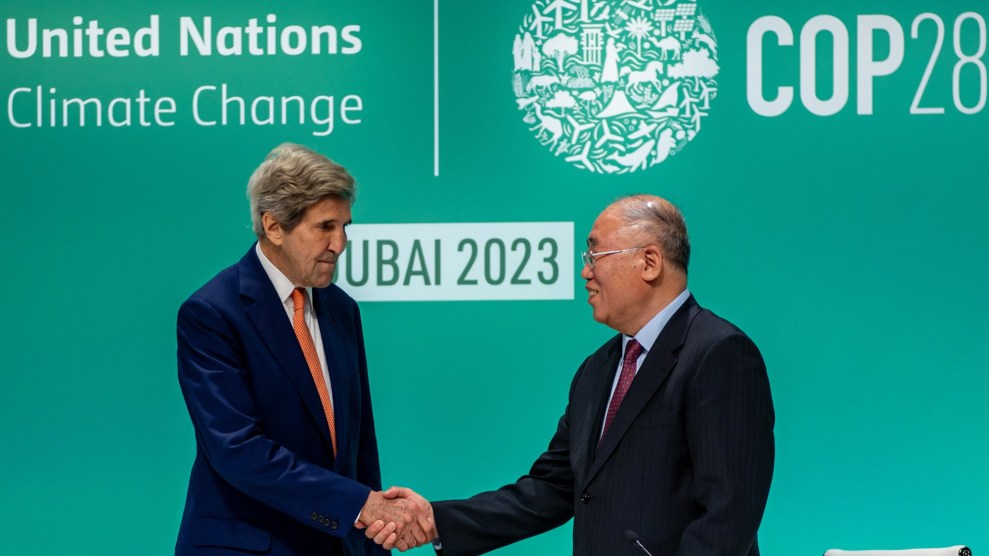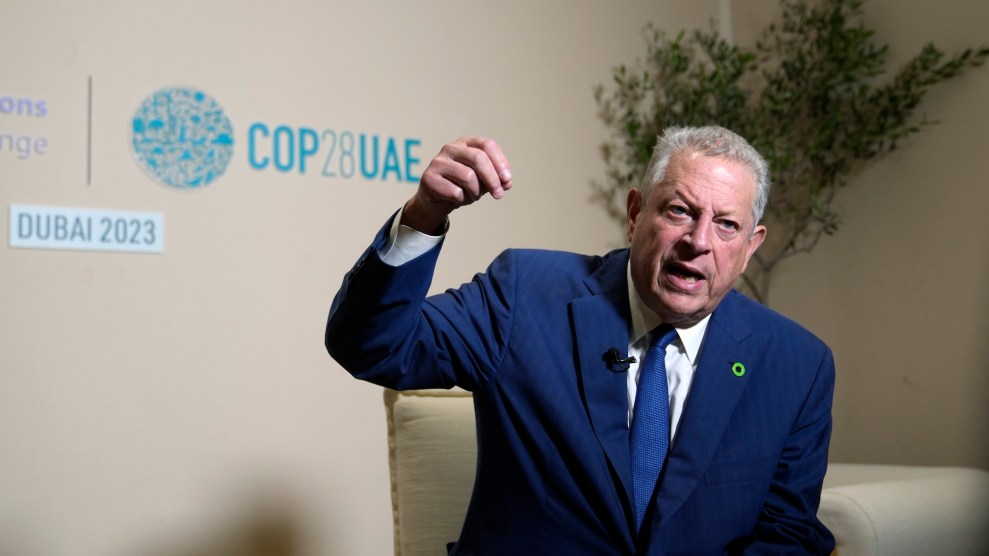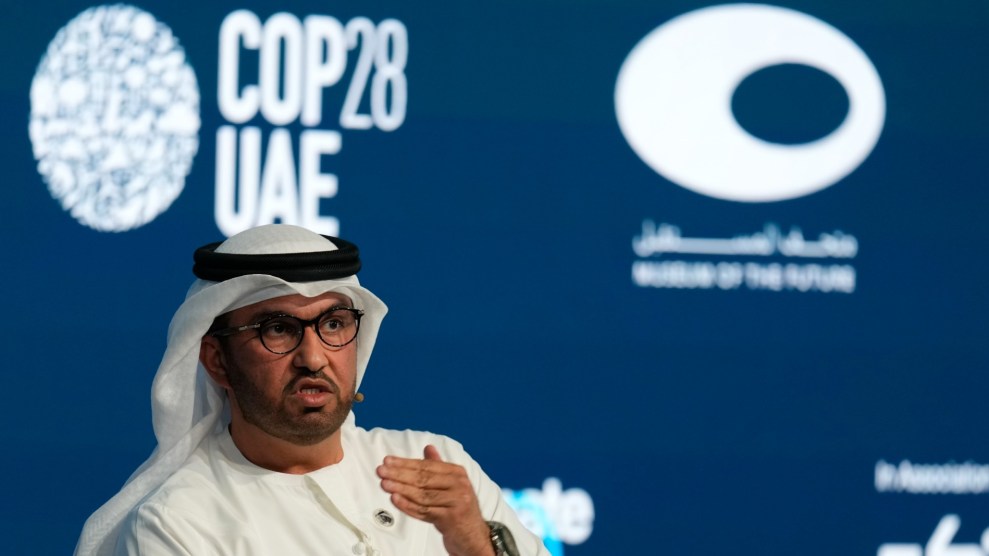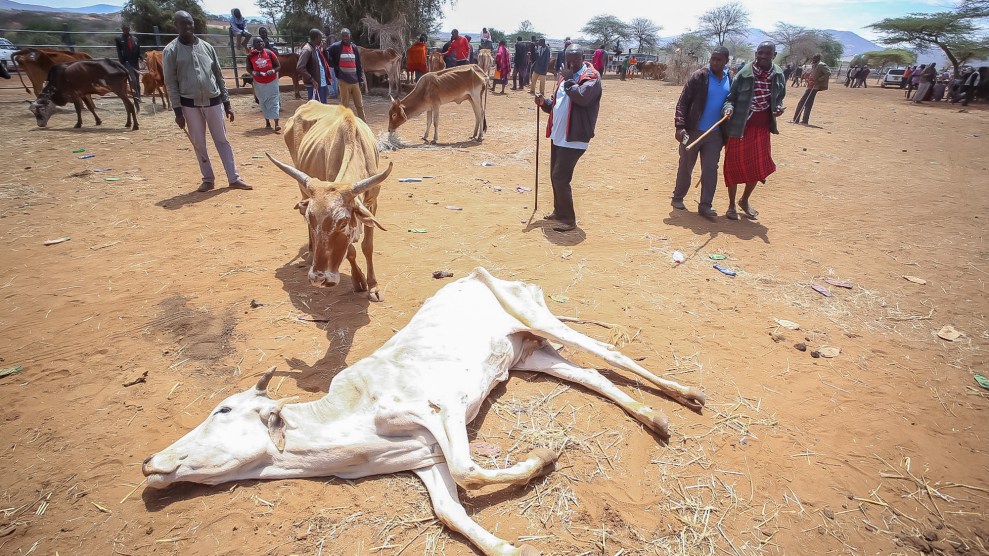
United States' Special Presidential Envoy for Climate John Kerry(L) and China's special envoy for climate change Xie Zhenhua (R) attend a press conference during the 2023 United Nations Climate Change Conference (COP28), in Dubai, United Arab Emirates, on December 13th, 2023. Martin Divisek/ZUMA
This story was originally published by the Guardian and appears here as part of the Climate Desk collaboration.
The decision text from Cop28 has been greeted as “historic,” for being the first ever call by nations for a “transition away” from fossil fuels, and as “weak and ineffectual” and containing a “litany of loopholes” for the fossil fuel industry. An examination of the text helps to explain this contradiction.
Reducing Fossil Fuel Use
The text states the huge challenge with crystal clarity:
Limiting global warming to 1.5C [above pre-industrial levels] with no or limited overshoot requires deep, rapid and sustained reductions in global greenhouse gas emissions of 43% by 2030 and 60% by 2035 relative to the 2019 level and reaching net zero carbon dioxide emissions by 2050. [Countries] further recognise the need for deep, rapid and sustained reductions in greenhouse gas emissions in line with 1.5C pathways.
The problem is that carbon emissions are not plunging as required—they are still rising. So the text on action is vital. The previous draft suggested measures that countries “could” take. The final agreement is somewhat stronger and “calls on” countries to do the following:
Tripling renewable energy capacity globally and doubling the global average annual rate of energy efficiency improvements by 2030.
This is good but, due to objections by China and India, fails to quantify the goals. That means countries could choose whatever baseline suits them, undermining the target.
Accelerating efforts towards the phase-down of unabated coal power.
This is no stronger than the text from Cop26 in 2021, which is disappointing as the dirtiest fossil fuel must unquestionably be phased out rapidly. Next in the decision text comes the pivotal paragraph:
Transitioning away from fossil fuels in energy systems, in a just, orderly and equitable manner, accelerating action in this critical decade, so as to achieve net zero by 2050 in keeping with the science.
Extraordinary as it might seem, this is the first time the root cause of the climate crisis—fossil fuels—have been cited in a decision text in nearly 30 years of UN climate talks. But “transitioning away” is weaker than “phasing out.” The latter was supported by 130 countries but fiercely opposed by petrostates. In the real world, fossil fuels are actually being phased up, with many new fields being exploited. Is “transitioning away” a strong enough signal to halt these investments? Probably not, but at least the direction of travel is finally clear.
A ‘Litany of Loopholes’
Accelerating zero- and low-emission technologies, including, inter alia, renewables, nuclear, abatement and removal technologies such as carbon capture and utilisation and storage (CCUS), particularly in hard-to-abate sectors, and low-carbon hydrogen production.
Fossil fuel states such as Saudi Arabia pushed very hard to include CCUS, as they see it as a way to continue their lucrative business, with the emissions being trapped and buried. But the vast majority of leaders and scientists see an extremely limited role for CCUS; it is expensive, currently far from the scale required, and does not even trap all emissions. The idea that it can allow fossil fuel firms to continue anything like business as usual is a “fantasy,” says the boss of the International Energy Agency.
Subsidizing the fossil fuels that drive global heating has been compared to pouring petrol on a fire: coal, oil, and gas get $7 trillion a year in support—that is $13 million a minute.
Phasing out inefficient fossil fuel subsidies that do not address energy poverty or just transitions, as soon as possible.
This is the first time such a call has appeared in a global UN decision, but “inefficient” is seen as a weasel word enabling nations to largely do as they please. The G20 promised the same in 2009, with no progress to date. Another weasel word is “transitional fuels”—it is code for fossil gas.
Recognises that transitional fuels can play a role in facilitating the energy transition while ensuring energy security.
This is the biggest win for the fossil fuel industry—it almost amounts to a poison pill in the agreement. It legitimizes gas burning on the basis that it is less polluting than coal, though liquefied natural gas may actually be even worse than coal due to methane leaks. It is worth noting that the US, the world’s biggest oil and gas producer, is planning a huge LNG expansion. The time for transitional fuels is long past; renewables are cheaper, faster and more secure.
What’s Not There
What is missing from the text is as important as what is in it, most importantly on finance. Money is needed to build out clean energy (mitigation), prepare vulnerable communities for escalating climate impacts (adaptation) and for recovery after disasters (loss and damage). The text acknowledges that trillions of dollars of investment will be needed, but fails to provide numbers on what will be provided and when. Without funding, all talk of climate action is cheap.
A global plan for adaptation, in UN-speak, was the top priority for some of the most vulnerable countries. But the text is weak and lacks specifics.
One last concern relates to ending the destruction of forests.
Results-based payments for policy approaches and positive incentives for activities relating to reducing emissions from deforestation and forest degradation, and the role of conservation, sustainable management of forests and enhancement of forest carbon stocks in developing countries.
This text raises the specter of rich nations paying to restore or protect forests in developing nations rather than reducing their own emissions.














